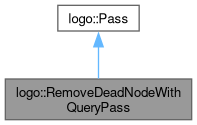Loading...
Searching...
No Matches
logo::RemoveDeadNodeWithQueryPass Struct Referencefinal
#include <RemoveDeadNodeWithQueryPass.h>
Collaboration diagram for logo::RemoveDeadNodeWithQueryPass:

Public Member Functions | |
| const char * | name (void) const final |
| bool | run (loco::Graph *g) |
| Run the pass. | |
 Public Member Functions inherited from logo::Pass Public Member Functions inherited from logo::Pass | |
| virtual | ~Pass ()=default |
Detailed Description
Definition at line 25 of file RemoveDeadNodeWithQueryPass.h.
Member Function Documentation
◆ name()
|
inlinefinalvirtual |
Reimplemented from logo::Pass.
Definition at line 27 of file RemoveDeadNodeWithQueryPass.h.
27{ return "RemoveDeadNodeWithQueryPass"; }
◆ run()
|
virtual |
Run the pass.
- Returns
- false if there was nothing changed
Implements logo::Pass.
Definition at line 29 of file RemoveDeadNodeWithQueryPass.cpp.
30{
31 // Let's enumerate nodes required to compute output nodes
33
34 // List dead(= non-active) nodes candidates
35 std::set<loco::Node *> candidates;
36
38 {
40 {
41 candidates.insert(node);
42 }
43 }
44
45 // Find the nodes that should not be dead node in candidates
46 for (auto it = candidates.begin(); it != candidates.end();)
47 {
48 if (auto service = (*it)->dialect()->service<DeadNodeQueryService>())
49 {
50 if (!service->isDeadNode(*it))
51 {
52 it = candidates.erase(it);
53 continue;
54 }
55 }
56 ++it;
57 }
58
59 for (auto node : candidates)
60 {
61 node->drop();
62 }
63
64 for (auto node : candidates)
65 {
66 g->nodes()->destroy(node);
67 }
68
69 return candidates.size() > 0;
70}
Definition LogHelper.cpp:20
std::set< Node * > all_nodes(Graph *)
Enumerate all the nodes in a given graph.
Definition Graph.cpp:59
std::set< loco::Node * > active_nodes(const std::vector< loco::Node * > &roots)
Enumerate all the nodes required to compute "roots".
Definition Algorithm.cpp:112
References loco::active_nodes(), loco::all_nodes(), and loco::output_nodes().
The documentation for this struct was generated from the following files:
- compiler/logo/include/logo/RemoveDeadNodeWithQueryPass.h
- compiler/logo/src/Passes/RemoveDeadNodeWithQueryPass.cpp